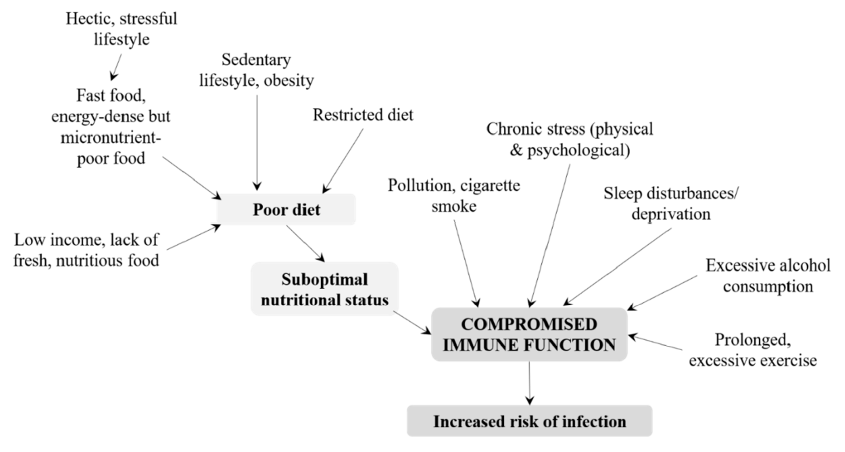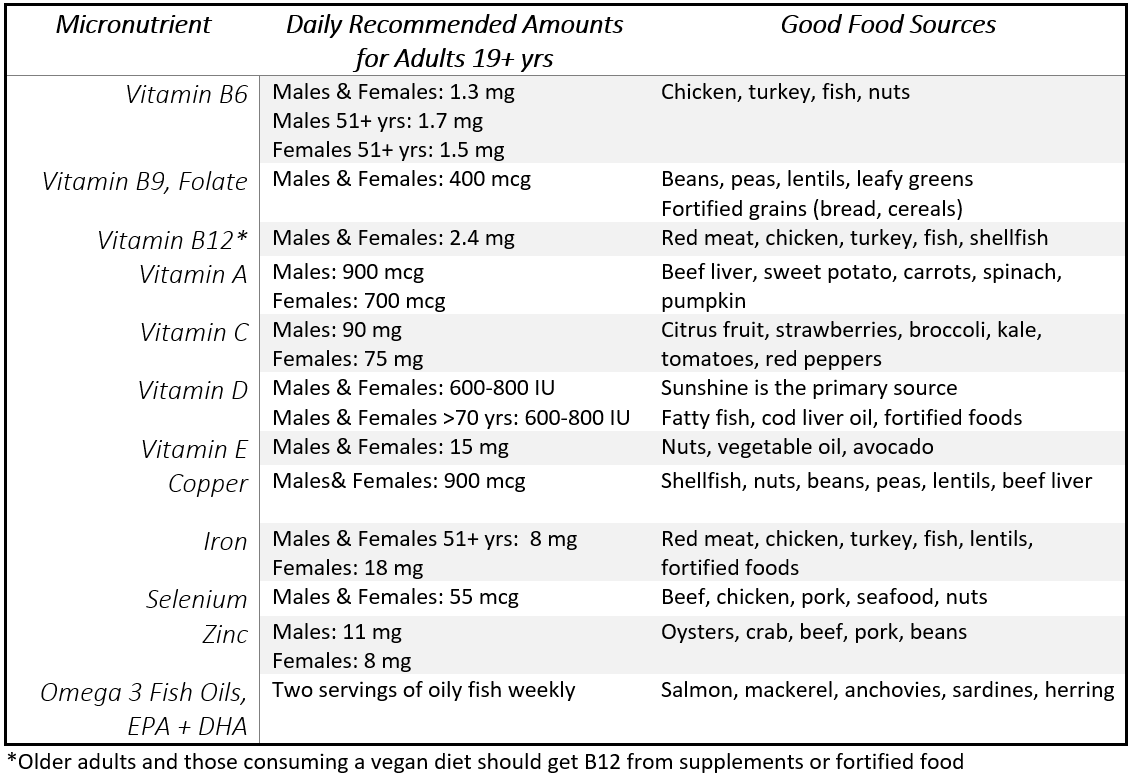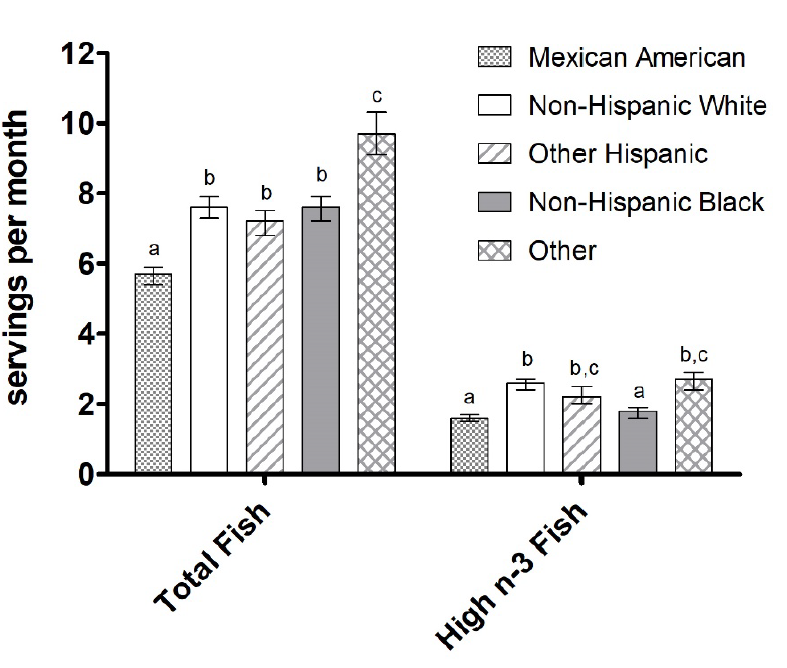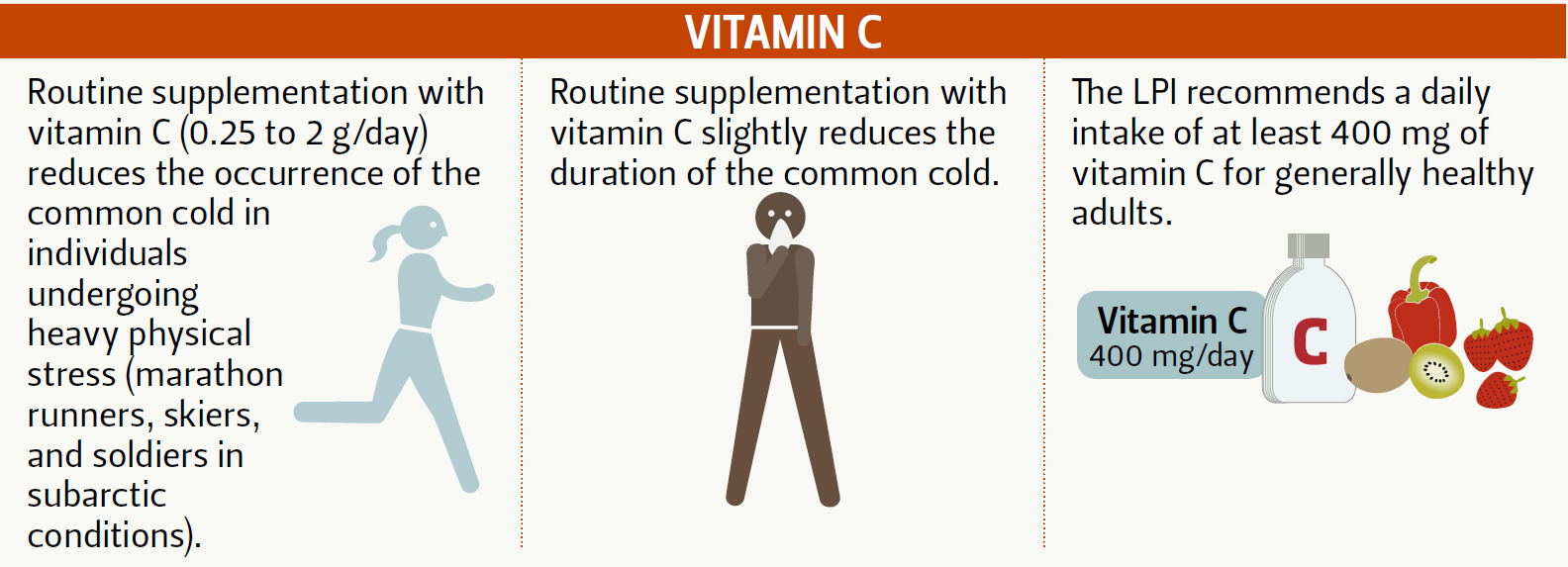Kat Barefield, MS, RD, CPT
Are there certain vitamins, minerals, or other supplements
that everyone should consider to support optimal health
and build a strong immune system? This article will answer that question and
cover more, including:
- unproven methods for treating and preventing the coronavirus
- factors that weaken the immune system
- the key micronutrients involved in the immune system
- which micronutrients most people fall short of
- why vitamin D is likely to be low in most people
- which micronutrients may be beneficial in higher than current recommended amounts
If anything on this list piques your interest, continue
reading.
The Truth About Supporting Your Immune System
I wish I could tell you to take a product or supplement that
would immediately boost your immune system and provide protection against the
coronavirus and other illness.
Unfortunately, that’s not how it works. Accomplishing a
fitness related goal such as losing body fat and keeping it off, building
muscle tissue, or improving strength requires consistency over time. The same
applies to building a strong immune system.
With the current Covid-19 pandemic, people are avidly seeking a way to hack
their immune system to somehow protect them from this novel virus. Opportunists
have attempted to peddle unproven methods to the public and at least 90
companies were sent warning letters by the Federal Trade Commission (FTC) and
Food and Drug administration (FDA).
[1] Letters were also sent to over 100 multilevel
marketers allegedly making claims and selling unapproved products related to coronavirus.
1
Some of the unproven remedies include:
- essential oils
- colloidal silver
- teas
- CBD
- detoxes
- herbs
- acupuncture
Factors that Weaken the Immune System
So, what can you do for your immune system? In
addition to avoiding unproven remedies that are wasteful and potentially
harmful, modifying behaviors that weaken the immune system is something you can
act on now even while under quarantine.
As depicted in the graphic below, some of these behaviors
include drinking excessive alcohol, eating high calorie, highly processed foods
devoid of micronutrients, being sedentary, cigarette smoking and sleep
deprivation.[2]

To frame it in a more positive light, you can strengthen
your immune system by doing these behaviors:
- Limit alcohol intake to 1 drink per day for women and 2 per day for men
- Incorporate relaxation techniques such as deep breathing, mediation, walks in nature, listening and/or dancing to your favorite songs
- Developing a creative hobby like gardening, painting, or sewing
- Include a variety of fresh fruits and veggies that you enjoy
- Prioritize good sleep hygiene such as avoiding screens an hour before bedtime
- Increase the daily number of steps you take by moving more throughout the day
- Better yet, rescue a dog and walk it daily
- Exercise regularly doing activities you enjoy
As the image above demonstrates, suboptimal nutritional
status contributes to a compromised immune system and increases the risk of
infection.
By improving your nutritional status your body will be
better equipped to respond optimally when exposed to viruses, bacteria, or
other infections. Let’s take a closer look at how to do this.
The Role of Micronutrients in Immune Function
Our immune system is a complex, multilayered combination of
physical and chemical protection against invaders such as bacteria and viruses.
Our skin, stomach acid, digestive enzymes, gut bacteria, and mucus membranes provide
the first barrier to entry of infectious invaders while white blood cells that
engulf and deactivate pathogens provide a second layer of protection.
We also have a third layer of immunity which gives us the
ability to make antibodies when exposed to a pathogen that not only destroy the
pathogen but also provide protection from future infection. All these processes
require nutrients, and the key ones involved include:
- Vitamins A, C, D, E, B6, B9 (folate/folic acid), B12
- Minerals zinc, iron, copper, selenium
- Omega-3 fish oils EPA (eicosapentaenoic acid) and DHA (docosahexaenoic acid)
Some of the immune cells create free radicals, or reactive
oxygen species which destroy invaders. Vitamins C and E and minerals iron,
zinc, copper, and selenium provide protection for the immune cells, so they’re
not damaged in the process. Because of this, they are sometimes referred to as
antioxidants.
Vitamins A, D, B6, B9, B12 and the minerals iron and zinc
are needed when white blood cell production is ramped up to fight a foreign body like a
novel virus or bacteria.
Inflammation is another response to infection and is needed
to isolate the area so white blood cells and antibodies can be delivered to
initiate healing a repair. Vitamin D, EPA and DHA play an important in ensuring
inflammation isn’t prolonged or excessive, which can delay healing or cause
additional damage. You want to make sure you have optimal amounts of these micronutrients
all the time to build and maintain a strong immune system. Unfortunately, most
people don’t.
.jpg)
The body requires optimal levels of
micronutrients for effective immune function, with different requirements
throughout every stage of life.2
Data Shows Americans are Lacking in Key Nutrients
Data shows that Americans are falling significantly short of
several micronutrients including those that support the immune system - vitamin
A, C, D, E, iron and the omega-3 fish oils, EPA and DHA.[4] I discuss this in more depth here.
If you’re a vegan or vegetarian, you’re more likely to have low
intakes of vitamin B12, zinc, omega-3 fish oils, vitamin D and iodine. If
you’re following a specific diet which restricts food groups or reduces calorie
intake, you’re probably missing some micronutrients.
There are two things you can do to fix this. First and
foremost, eat a micronutrient rich diet with a variety of colorful, minimally
processed foods from all major food groups. Below is a chart which you may find
helpful.
Selected Micronutrients Involved
in the Immune System

Older
adults and those consuming a vegan diet should get B12 from supplements or
fortified food
The ultimate balancing act is
eating the right portions of all these different foods to achieve and maintain
a healthy body weight. Since most eating patterns fall short of recommended
amounts for several of the micronutrients, a multivitamin and mineral formula
with the common under consumed nutrients that is suitable for your age and life
stage is a smart strategy for filling in gaps “just in case” and for ensuring
you’re getting what you need consistently. Check out this article for more info on
this.
What I don’t recommend is mega-dosing on single vitamins and
minerals unless you have a medical need to do so and you’re under the care of a
doctor or dietitian. By mega-dosing I mean taking vitamins, minerals or other
nutrients in amounts that exceed the tolerable upper limit, which is the amount
you can consume with little to no likelihood of adverse effects. Once you
exceed the upper limit, you’re putting yourself at risk of toxicity,
particularly with the fat-soluble vitamins which are stored in the body. If
you’re taking any medications, you definitely want to check in with your doctor
prior to taking any supplements.
Research indicates some nutrients may be beneficial when
taken in higher amounts than the recommended dietary allowances (RDA) but lower
than the upper limit. More details below.
Supplements Everyone Should Consider to Support Your Immune System
Vitamin D
Like the ~30 micronutrients that are essential for human
health, vitamin D plays a critical role in numerous functions in the body
including normal growth and development, bone health, immunity, and muscle
metabolism. Here’s more on vitamin D’s role:
- Maintenance of blood levels of calcium
- Absorption of calcium in the GI tract
- Normal bone mineralization
- Prevents rickets in kids
- Prevents osteomalacia in adults
- Protects older individuals from developing osteoporosis
- Reduces inflammation
- Modulates the immune system via receptors on various white blood cells including macrophages and T cells
- Supplementation reduces incidence of respiratory infections[5]
Vitamin D is unlike the other vitamins and minerals because
1) it has hormone like functions and 2) it can be made in the body when skin is
exposed to the sun (UVB radiation). There are a limited number of natural vitamin
D food sources including fatty fish, cod liver, and mushrooms exposed to UV
light. Vitamin D is also in fortified foods – milk, cheese, and milk
alternatives.
Here’s the back story on Vitamin D fortification: as the
U.S. workforce transitioned from agricultural to industrial, people began
working indoors, and vitamin D deficiency became common. As a result, the
normal growth and development of kids became impaired, resulting in rickets.
This ultimately led to vitamin D being added to the food supply through fortification
of milk and dairy products. Nonetheless, deficiency and insufficiency of this
key nutrient sill occurs on a global scale with approximately 70-90% of
Americans failing to meet requirements.[6]

Certain groups are at greater risk for deficiency including:
- Older adults due to poor absorption in the gut,
poor conversion, and limited time spent in the sun
- Obese individuals whose higher body fat levels
can store the vitamin and prevent it from reaching receptors throughout the
body
- Those who live in northern latitudes where there
is insufficient UV light
- Dark skinned individuals who have more skin
pigmentation (melanin) which blocks UV light
The most reliable way to determine whether you’re getting
enough vitamin D is to get your blood levels tested. Here’s where things get
tricky. Different organizations have their cutoff recommendations for vitamin D
blood levels (technically serum levels of 25-hydroxyvitamin D).
The Institute of Medicine deems blood levels of vitamin D
adequate at 20 ng/mL whereas the Endocrine Society recommends higher levels
(30-40 ng/mL) to confer greater health outcomes. This which would require
adults to supplement at least 800-1,000 IUs daily. More may be needed for
at-risk individuals as described above.
A comprehensive review of the research on vitamin D’s immunologic effects on health and disease
concluded the following:[7]
The bottom line is that there is no
downside to increasing our intake of vitamin D to maintain serum 25(OH)D at at least 30 ng/mL (75 nmol/L), and preferably at 40–60
ng/mL (100–150 nmol/L) to achieve optimal overall health benefits of vitamin D.
The daily recommendation (RDA) is 600 IU/day if you’re
between 18 and 70 years old and 800 IUs if you’re older than 70. These amounts
would likely be too low to achieve optimal levels as noted above.
You may be wondering how much is too much. The tolerable
upper limit for Vitamin D is 4,000 IU/day for those not at risk for deficiency
and 10,000 IU/day for those at risk for deficiency.[8]
The practical takeaway is that 1) if you’re not getting regular
sun exposure directly to your skin (15-30 minutes daily while avoiding sunburn)
and 2) you’re not consuming food sources that meet daily requirements, or 3)
you’re in one or more of the groups that are at risk for deficiency, vitamin D supplementation below the tolerable
upper limit should be considered to raise your blood levels to ~30 ng/mL. Dosages above 4,000 IUs/day should be done only with
medical guidance.
Vitamin D, Respiratory Tract Infections and Covid-19
Vitamin D supplements for the treatment and prevention of
coronavirus have not been tested. So far, there’s observational data which
shows an association between low levels of vitamin D and greater infection
rates and severity of Covid-19.[9],[10] The pandemic may result in people
spending more time indoors, thus limiting sunlight exposure and reducing
vitamin D levels.
There are randomized, double blind, placebo-controlled
trials on vitamin D supplements and the prevention of respiratory tract
infections. One systematic review and meta-analysis of nearly 11,000 people revealed
that vitamin D supplements resulted in significantly fewer participants having
at least one respiratory tract infection.5 The most deficient individuals received the greatest protection
and daily or weekly intake of vitamin was found to be effective compared to
bolus dosing. Furthermore, taking
vitamin D supplements was found to be safe, with serious adverse events being
rare and of equal occurrence between those taking supplements and those taking
a placebo.
These findings are similar to those of the Linus Pauling
Institute at Oregon State University as depicted in the table below.[11] Keep in mind, these findings are not specific to the coronavirus.

Omega 3 Fish Oils
The fats that are present in oily fish, EPA and DHA, play a
vital role in brain health, heart health, eye health, and immunity. Here are
some examples of their functions:
- Structural components of cell membranes
- DHA is highly concentrated in the brain and eyes
- They are used to form other compounds called
eicosanoids which help regulate the immune system
- They have anti-inflammatory effects and may be
beneficial in the immune response.[12],[13]
EPA and DHA can be made in the body from the essential fat,
alpha linoleic acid (ALA) which is present in chia seeds, walnuts, flaxseed
oil, and canola oil but the conversion is poor. Hence, to raise levels in the
body, one must consume them from supplements or dietary sources such as herring,
salmon, sardines, and oysters.
Interestingly, an RDA has not been established for EPA and
DHA. The American Heart Association (AHA) recommends at least two servings (8
ounces) of oily fish per week for generally healthy people and four servings of
oily fish per week or 1 gram of EPA and DHA from supplements for those with
coronary heart disease. Higher amounts are recommended (2-4 grams of EPA and
DHA from supplements) to lower triglycerides at the direction of a physician.
The table below contains recommendations for EPA and DHA
intakes from various organizations.
|
American
Heart Association
|
· Two servings (8 ounces) of oily fish per week
|
|
International
Olympic Committee[14]
|
· 2,000 mg of EPA + DHA from oily fish or
supplements for high- performance athletes to support recovery
|
|
Linus
Pauling Institute, Oregon State University
|
· Oily fish twice per week + walnuts, flaxseeds,
flaxseed or canola oil
· 2 grams of EPA + DHA supplements several times
a week if not consuming fatty fish
|
|
World
Health Organization
|
· 200-250 mg of EPA + DHA per day for general
health
· 2 grams per day for prevention of heart disease
|
|
European
Food and Safety Authority
|
· 250 mg of EPA + DHA per day
|
|
International
Society for the Study of Fatty Acids and Lipids
|
· 500 mg of EPA + DHA per day minimum for
cardiovascular health
|
Regardless of ethnicity, intakes of oily fish rich in
omega-3’s are substantially lower than all the recommended intakes above, as
shown in the graph below.[15] All ethnic groups consume less than 4
servings of oily fish a month, which is less than half of what’s recommended.
Taking this data into account, it is no surprise that adults
in the U.S. are falling short of omega-3 recommendations, with an average
intake of EPA and DHA of 100 mg/day.15

Given the role omega-3 fish oils play in supporting the
immune system and reducing inflammation, consuming two servings of oily fish
weekly would help increase EPA and DHA amounts in the body.
Those who are not eating adequate
amounts of fish can increase their intake of the omega-3 fats, EPA and DHA
using a fish oil supplement. Vegans and vegetarians can increase intakes with
algal or krill oil supplements.
Vitamin C
Vitamin C, or ascorbic acid, is arguably the most popular
supplement used to support the immune system. Vitamin C is not only needed to
form collagen in our skin, but it also helps immune cells with its antioxidant
activity.
The strongest evidence for vitamin C is in 1) reducing the
duration of the common cold and 2) reducing the occurrence of a common cold in
athletes when taken regularly as a preventative aid as opposed to what many
people do, which is take high doses after they get sick.
Although the RDA is 75 mg for women and 95 mg for men,
routine supplementation with at least 400 mg/day for generally healthy people
may help reduce the length and/or severity of symptoms for the common cold.[16]
Athletes training for endurance events or intense combat
training may benefit from taking 250-2,000 mg/day.[17]

Summary
Consistency is key to getting results, whether that’s losing
weight, building muscle, or developing a strong immune system. A wise approach
would be to reduce or eliminate behaviors that weaken the immune system while
optimizing your nutritional status to strengthen the immune system. This can be
done by 1) consuming a wide variety of minimally processed foods from all food
groups to maximize intake of vitamins, minerals, and other micronutrients like
omega-3 fats, flavonoids and polyphenols and 2) complementing your food intake
by supplementing with nutrients you’re falling short of.
If you’re not consuming fatty fish at least twice a week to
get the immune supporting nutrients EPA and DHA, a fish oil supplement is
something to consider. Vitamin D is
involved in hundreds of metabolic processes throughout the body and supplementation
has been shown to be protective of respiratory tract infections in clinical
trials. Data consistently shows that most
Americans do not have optimal blood levels of at least 30 ng/mL, so this
supplement is another one worth considering, particularly if you have dark
skin, you stay indoors, you’re overweight or obese or you’re older.
Finally, recall that micronutrients work synergistically
throughout the body and in each layer of the immune system, so be sure to take
a daily multivitamin and mineral formula to make up for any gaps in your diet.
A panel of 14 international nutrition
experts concluded that multivitamin and mineral supplements can broadly improve
micronutrient intakes and achieving the recommended dietary allowances for
micronutrients is the goal for long-term health. [18]
References
[2] Maggini, S, Pierre, A. Calder, PC. Immune function and micronutrient
requirements change over the life
course. Nutrients 2018, 10, 1531. PMID: 30336639
[3] Gombart
AF, Pierre A, Maggini S. A Review of Micronutrients and the Immune
System-Working in Harmony to Reduce the Risk of Infection. Nutrients.
2020;12(1):236. Published 2020 Jan 16. doi:10.3390/nu12010236. PMID 31963293
[4] Dietary
Guidelines for Americans 2015-2020. 8th ed. Washington, DC: U.S.
Department of Health and Human Services; U.S. Department of Agriculture, 2015.
[5]Martineau AR, Jolliffe DA, Hooper RL, et al. Vitamin D
supplementation to prevent acute respiratory tract infections: systematic
review and meta-analysis of individual participant data. BMJ.
2017;356:i6583. Published 2017 Feb 15. doi:10.1136/bmj.i6583. PMID: 28202713
[6] Palacios, C.; Gonzalez, L. Is vitamin D deficiency a major global public health
problem? J. Steroid Biochem.
Mol. Biol. 2014, 144PA, 138–145. PMID: 24239505
[7] Charoenngam,
N.; Holick, M.F. Immunologic Effects of Vitamin D on Human Health and Disease. Nutrients 2020, 12, 2097.
[8] Holick MF, Binkley NC, Bischoff-Ferrari HA, et al. Evaluation, treatment, and
prevention of vitamin D deficiency: an Endocrine Society clinical practice
guideline [published correction appears in J Clin Endocrinol Metab. 2011
Dec;96(12):3908]. J Clin Endocrinol Metab. 2011;96(7):1911-1930.
doi:10.1210/jc.2011-0385. PMID: 21646368
[10] Laird
E, Rhodes J, Kenny RA. Vitamin D and Inflammation: Potential Implications for
Severity of Covid-19. Ir Med J. 2020;113(5):81. Published 2020 May 7. PMID: 32603576
[12] Calder PC. n-3 fatty acids, inflammation and immunity: new mechanisms to
explain old actions. Proc Nutr Soc. 2013;72(3):326-336.
doi:10.1017/S0029665113001031 PMID: 23668691
[13] Tan A, Sullenbarger B, Prakash R, McDaniel JC. Supplementation with
eicosapentaenoic acid and docosahexaenoic acid reduces high levels of
circulating proinflammatory cytokines in aging adults: A randomized, controlled
study. Prostaglandins Leukot Essent Fatty Acids. 2018;132:23-29.
doi:10.1016/j.plefa.2018.03.010. PMID: 29735019
[14] Maughan RJ, Burke LM, Dvorak J, et al. IOC consensus statement: dietary
supplements and the high-performance athlete. Br J Sports Med.
2018;52(7):439-455. doi:10.1136/bjsports-2018-09902 PMID: 29540367
[15] Cave C, Hein N, Smith LM, et al. Omega-3 Long-Chain Polyunsaturated Fatty Acids
Intake by Ethnicity, Income, and Education Level in the United States: NHANES
2003-2014. Nutrients. 2020;12(7):E2045. Published 2020 Jul 9.
doi:10.3390/nu12072045. PMID: 32660046
[16] Hemilä H, Chalker E. Vitamin C for preventing and treating the common cold. Cochrane
Database Syst Rev. 2013;(1):CD000980. Published 2013 Jan 31. doi:10.1002/14651858.CD000980.pub4. PMID: 23440782
[17] Hemilä H, Chalker E. Vitamin C for preventing and
treating the common cold. Cochrane Database of Systematic Reviews 2013, Issue
1. Art. No.: CD000980. DOI: 10.1002/14651858.CD000980.pub4.
[18] Blumberg
JB, Cena H, Barr SI, et al. The Use of Multivitamin/Multimineral Supplements: A
Modified Delphi Consensus Panel Report. Clin Ther. 2018;40(4):640-657.
doi:10.1016/j.clinthera.2018.02.014. PMID: 29573851